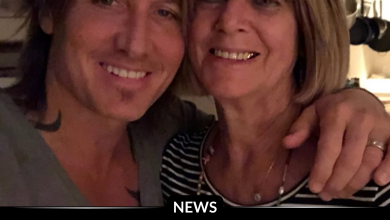Emma Heming Willis Shares the Heartbreaking Moment She Realized Bruce’s Speech Wasn’t Just a Stutter
OPINION: This article may contain commentary which reflects the author's opinion.
Bruce Willis, the iconic action star known for his roles in Die Hard and The Sixth Sense, has faced a profound health challenge in recent years. In March 2022, the actor’s family announced his retirement from acting after being diagnosed with aphasia, a condition that impairs language processing, including reading, writing, and speaking. By February 2023, it was confirmed that Willis’ condition had progressed to frontotemporal dementia (FTD), a rare and often aggressive form of dementia that primarily affects communication and behavior, rather than memory.
As the Willis family navigates this difficult journey, his wife, Emma Heming Willis, has been an outspoken advocate for FTD awareness, sharing intimate details about Bruce’s health with the public. In an October 2024 interview with Town & Country, Emma spoke about the first signs she noticed in her husband, which eventually led to his dementia diagnosis.
The First Sign: Language Changes Misunderstood as Part of His Stutter
Emma recalled the first noticeable change in Bruce’s behavior was related to his speech. Bruce, who had struggled with a severe stutter as a child, had developed techniques over the years to manage it, including memorizing scripts to avoid stuttering during his acting career. When Emma first observed changes in his language, she initially attributed it to a variation of his lifelong stutter. “As his language started changing, it (seemed like it) was just a part of a stutter, it was just Bruce,” Emma said. “Never in a million years would I think it would be a form of dementia for someone so young.”
This misunderstanding of the early signs is a common issue with frontotemporal dementia, as it can manifest in ways that are easily overlooked or attributed to other conditions. Emma’s reflection highlights the complexity of recognizing neurological changes in someone like Bruce, who had lived with a stutter for much of his life.
The Slow Realization and the Diagnostic Journey
Over the next few years, the subtle changes in Bruce’s speech became more pronounced. Emma, who had been closely observing her husband, noticed a continued decline in his language abilities, which eventually led to a more formal diagnosis of frontotemporal dementia in early 2023. The diagnostic process was a long one, with multiple stages, as FTD is less commonly recognized and often mistaken for other conditions, especially in younger individuals like Bruce, who was in his 60s at the time of his diagnosis.
This timeline of recognition, from the initial symptoms in 2020 to the eventual diagnosis in 2023, illustrates the difficulty of identifying FTD in its early stages. In many cases, such as Bruce’s, the early signs can be mistaken for other issues, and the disease can be misdiagnosed for years.
Family Perspectives: Not Just Emma’s Observations
While Emma’s observations were pivotal in recognizing Bruce’s health challenges, other family members, such as his daughter Tallulah Willis, also noticed early signs. In a personal essay for Vogue, Tallulah recalled seeing unresponsiveness from her father and initially attributing it to possible hearing loss. However, by the summer of 2021, during a family wedding, she realized the gravity of the situation. Although this timeline is important, the primary focus remains on Emma’s experience as his spouse, providing an intimate account of the earliest noticeable changes.
The Role of Public Advocacy and Raising Awareness for FTD
Emma Heming Willis’ candidness about the changes she observed in Bruce’s speech has helped shine a spotlight on frontotemporal dementia, a condition that is often overshadowed by more widely known forms of dementia like Alzheimer’s. FTD’s symptoms, particularly its impact on language and behavior, are sometimes dismissed as signs of aging or stress, making early detection a significant challenge.
Through her public advocacy, Emma has contributed to greater awareness about FTD and its subtle, early signs. She has used her platform to encourage others to recognize the importance of noticing changes in behavior or language, even when they might seem benign or easy to overlook. By sharing her story, Emma has not only highlighted the struggles of her family but also helped others understand the importance of early diagnosis and intervention for this rare condition.
The Family’s Support and the Ongoing Journey
In addition to Emma’s advocacy, the support of Bruce’s extended family, including ex-wife Demi Moore and their daughters Rumer, Scout, and Tallulah, has been crucial throughout this journey. The Willis family has consistently shown their unity and strength, supporting Bruce through his health challenges with love and compassion. Their openness in the media has not only raised awareness about FTD but also allowed the public to witness the strength of their familial bond.
Emma’s insights, shared through interviews and social media, have been an essential part of educating the public on FTD, shedding light on the complexities of the disease and the impact it has on both those living with it and their loved ones. As the Willis family continues to navigate this journey, Emma’s advocacy serves as an important reminder of the importance of recognizing and understanding the early signs of dementia.
Conclusion: A Powerful Reminder of Love, Loss, and Advocacy
Bruce Willis’ diagnosis of frontotemporal dementia has been a challenging and emotional journey for his family, but through Emma Heming Willis’ openness and advocacy, the public is gaining a better understanding of this rare condition. The first sign Emma noticed—changes in Bruce’s language—was a pivotal moment in their lives, and through her shared experiences, she has become a powerful voice for FTD awareness. While the road ahead remains difficult, Emma’s strength in supporting Bruce and raising awareness for FTD is a testament to the power of love and advocacy in the face of adversity.



